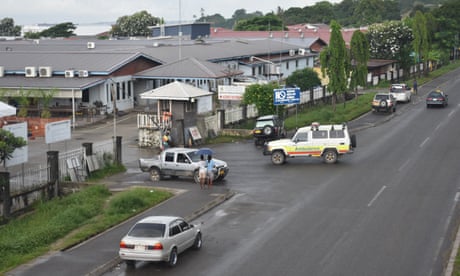- by foxnews
- 17 Mar 2025
‘People are dying on the floor’: healthcare workers tell of Covid devastation in Solomon Islands
‘People are dying on the floor’: healthcare workers tell of Covid devastation in Solomon Islands
- by theguardian
- 22 Feb 2022
- in news

Frontline health workers in Solomon Islands have warned that its health system is on the brink of collapse as the country struggles to deal with a devastating outbreak of Covid-19.
A senior doctor and two nurses at the National Referral Hospital (NRH) in the capital of Honiara have told of how there are no beds for Covid patients - leading to people dying on the floor of the wards - as well as a lack of facilities and staff shortages that have led to Covid-positive nurses being recalled to work and probationary nurses tending to critically ill patients solo, when they should be supervised by a more senior nurse.
Solomon Islands, a country of about 700,000 people in the South Pacific, had remained Covid-free throughout the pandemic, without a single case of the virus in 2020 and 2021. However, since Covid arrived in the country in mid-January, the country has recorded nearly 6,000 cases and around 70 deaths.
The doctor, speaking on condition of anonymity, said the true number of deaths was likely to be much higher.
"We have witnessed that there are deaths at home, not brought to hospital because of the fear that any dead body that comes to the hospital will be swabbed and once tested positive will not be allowed to be taken out by the relatives," he said. "So some deaths are kept at home and it's a sad and terrible thing to happen."
The doctor warned that healthcare facilities were struggling to cope, with the 56-bed Central field hospital fully occupied. He said that while tents had been prepared outside the hospital for the treatment of Covid-19 patients, they had no toilets, shower rooms or air-conditioning, which he alleged showed the government's lack of preparation.
"I would say that the government has failed this nation."
NRH has turned its orthopaedic ward into a "red zone" Covid ward, where critically ill patients needing oxygen are treated. But both he and a nurse in the hospital confirmed there were Covid patients across other wards in the hospitals.
Staff were completely overwhelmed by the number of cases, the doctor said.
"We do not have enough nurses to look after the Covid-19 patients, meaning there's no proper observations and monitoring will take place on sick patients."
A registered nurse, who wished to remain anonymous, said staff were so overstretched that Covid-positive nurses were being called in to work.
"In the past weeks, we have had no option but to recall those tested positive yet asymptomatic to come back to work as we can't handle the increasing Covid-19 cases daily."
A newly-graduated probationary nurse who is working at NRH said junior nurses, who are meant to be supervised, were looking after critically ill patients by themselves.
The doctor warned that patients suffering from other illnesses and conditions, such as cancer, diabetes, high blood pressure, and those requiring surgery were not getting treatment, monitoring or medication, potentially leading to more deaths.
Last week, the government issued a statement saying the rapid spread of Covid was beyond the testing capability of health authorities, contributing to under-reporting of actual case numbers since the outbreak began.
The health minister, Dr Culwick Togamana, warned last week that the health system could not cater for all the people who tested positive or were showing symptoms of Covid.
"That is why we have advised those with mild symptoms to strictly isolate at home and only moderate to severe cases [be] brought to health facilities for clinical management," he said.
At the end of 2021, Solomon Islands had a very low vaccination rate, with about 20% of adults fully vaccinated.
Since the outbreak, vaccination sites that remained empty all of last year are now experiencing massive turnout from the public, and the health minister said there had been allegations of medical practitioners selling vaccines to people.
The ministry of health did not respond to questions.
- by foxnews
- descember 09, 2016
Rare artifacts representing America's 250th birthday will be featured in major exhibition
Rare artifacts will be featured in the "Give Me Liberty" exhibit at the Virginia Museum of History & Culture in Richmond to commemorate America's upcoming 250th anniversary.
read more


